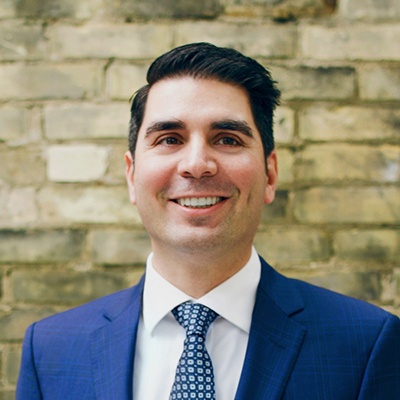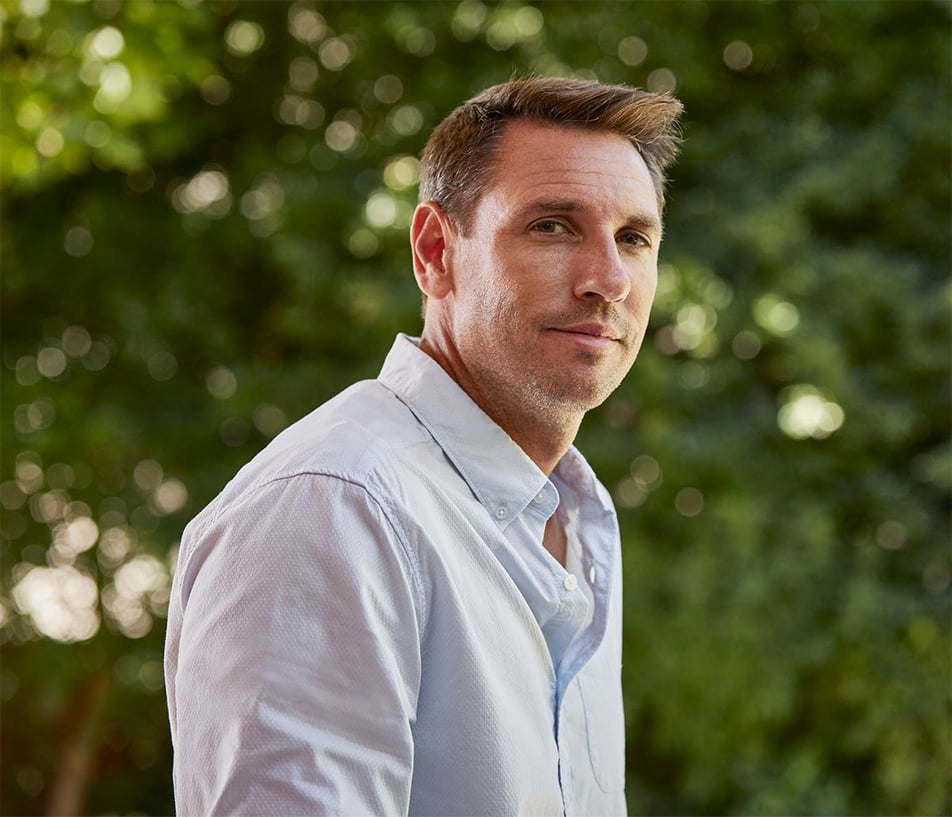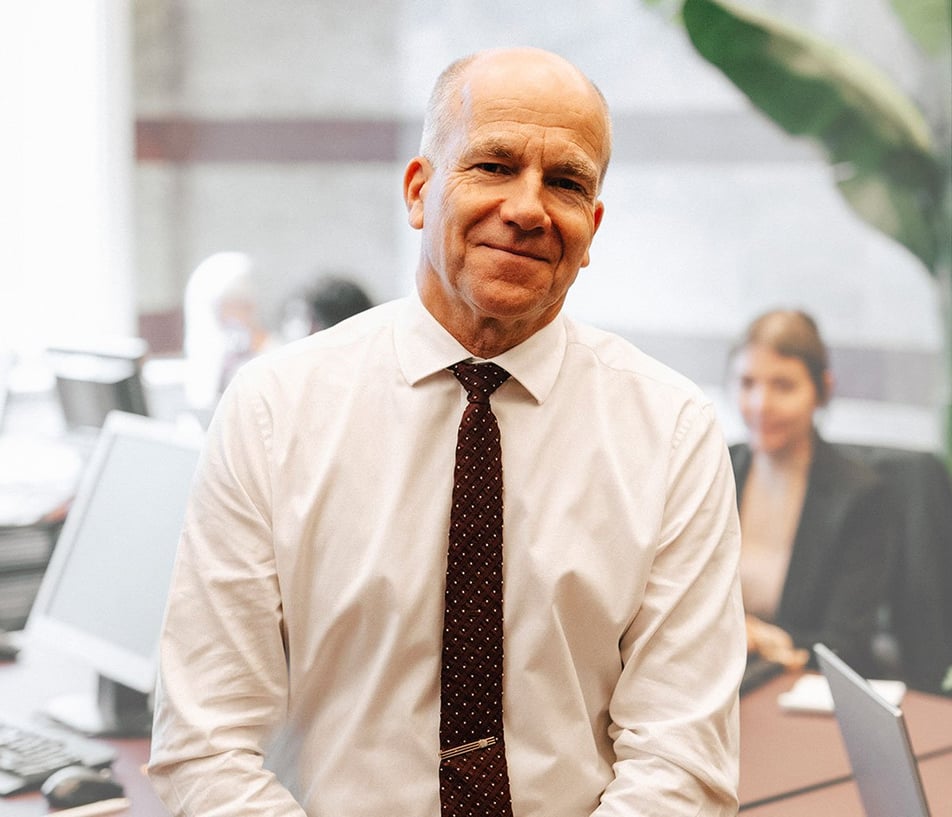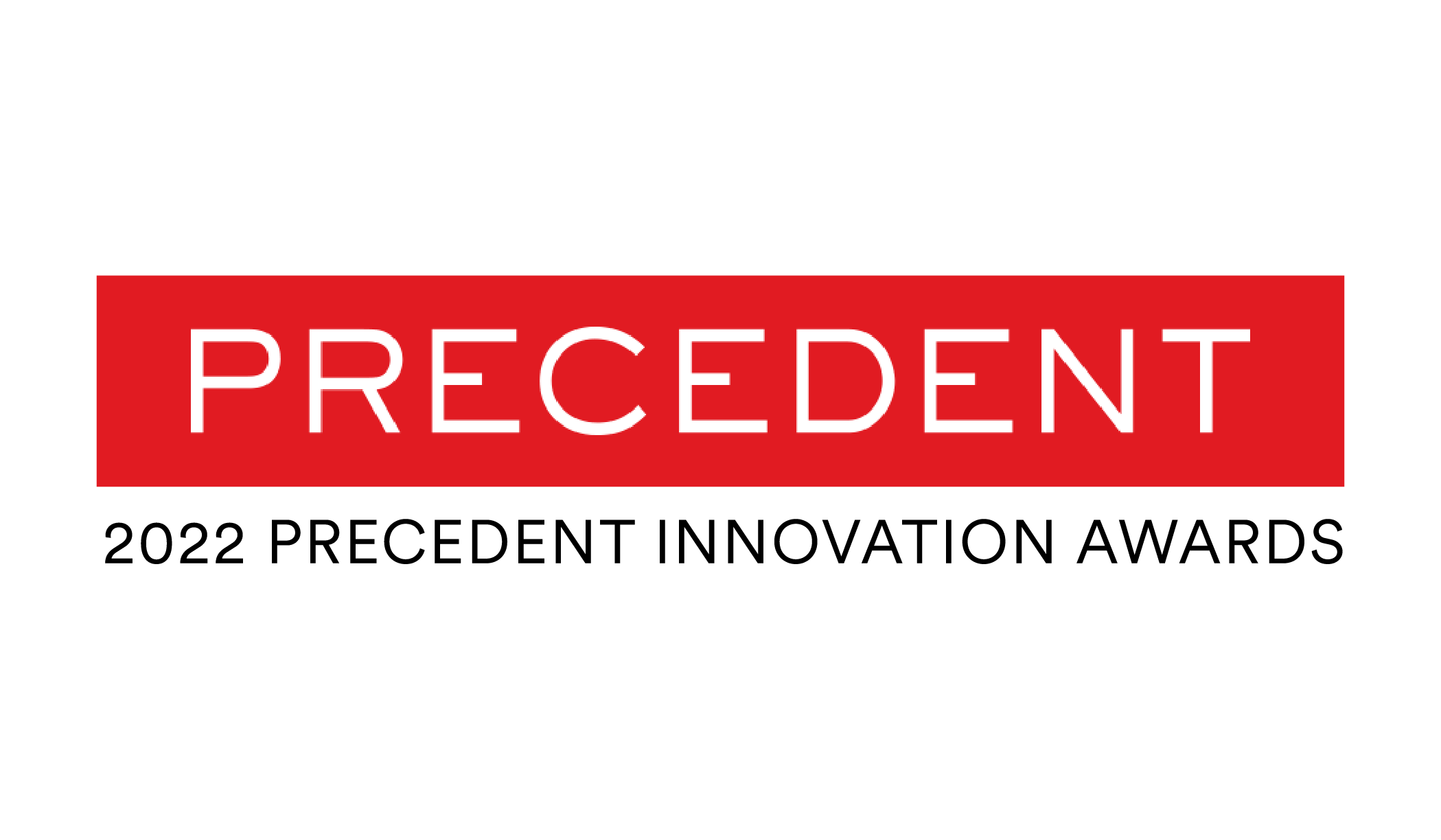
Aly Haji is researching what it means to be a millennial at a law firm – why they're leaving en masse, why they find their jobs soul-crushing, and why all of this is a real problem for law firms. Peter Aprile and Natalie Worsfold talk to him about the stories his research is uncovering and get him to explain the unnerving results so that law firm leaders can figure out some concrete next steps to stall the exodus.
Also joining BNL for the first time is Brittany Rossler, summer associate at Counter Tax Lawyers. We dragged her in front of the mic to give her opinion as a real-life millennial working at a real-life law firm – and, spoiler alert, she gets a bit riled up.

Peter Aprile is a senior lawyer specializing in tax dispute resolution and litigation. His vision as Counter’s founder and his everyday role at the firm are one and the same: to be an agent of change, uncovering opportunities and developing strategies that achieve more than anyone expected. A creative thinker, Peter studies problems from all different angles to find what others have missed. He’s also convinced that he likes winning more than most people.
Different people describe Peter in different ways. At the CRA and the federal Department of Justice, the word relentless comes up quite a lot. Admittedly, so does the word a**hole – but it’s often said with a certain grudging respect, if not affection. Peter’s clients call him a saint. Well, some of them, anyway. His colleagues describe him as empowering and harddriving, but fair. Peter’s friends call him loyal. His wife describes him as a lot to deal with, but worth it. Peter encourages his young daughter and son to call him “The Big Homie,” though with limited success. His mother describes him with the single word mischievous – before going on to complain that he should call more.

Natalie is a tax lawyer who represents individual taxpayers and owner-managed businesses in disputes with the Canada Revenue Agency (CRA). She also successfully challenges CRA decisions denying taxpayer relief and helps facilitate applications under the Voluntary Disclosures Program.
But what you really need to know about Natalie is that she’s a tax litigator with heart. When she takes a case, it’s not out of technical interest – it’s because she cares. And if she believes the government has got something wrong, she won’t stop until it’s been put right. She’s fierce.
Natalie is the co-architect behind many of Counter’s process workflows, software and data analytics systems, as well as our comprehensive knowledgebase (loving named Hank). And when it comes to preparing cases, she’s Counter’s secret weapon – happiest when elbow-deep in evidence, meticulously building creative solutions to seemingly impossible problems. Because the fact is Natalie sees things that other people don’t.
Natalie’s family and friends describe her as loyal, selfless, understanding and fun. They also mention stubborn. To her Counter colleagues she’s a combination of stellar brainpower and contagious enthusiasm who elevates the game of everyone around her.
People
Practices
Tech, Tools & More
[00:00] [background music]
Peter Aprile: [00:08] Hi, and welcome to "Building NewLaw," Canada's first and only CPD‑accredited podcast. It's hosted by me, Peter Aprile, and my colleague, Natalie Worsfold.
Natalie Worsfold: [00:16] In each episode, we interview lawyers, legal technologists, and other like‑minded people at the forefront of new law.
Peter: [00:24] We hope that the podcast connects the new law community and helps us all learn more about the approaches that are changing the way that we practice law.
Natalie: [00:29] To learn how you can use this podcast to satisfy your Law Society CPD requirements, visit our website at countertax.ca/bnlcpd. That's countertax.ca/bnlcpd.
Peter: [00:39] Enjoy the show.
[00:39] [background music]
Peter: [00:39] The Building New Law podcast is supported by Counter Tax Lawyers, a new type of tax controversy and litigation law firm. To learn more about Counter, go to countertax.ca.
Natalie: [01:00] Today, we're speaking with Aly Haji. Aly is a recent LLB and MBA graduate from McGill University.
[01:10] Aly caught our eye because he has released two great research papers about changes in the legal profession. The first was called "The Illusion of Innovation at Law Firms." And Aly's most recent paper is "An Exodus Explained ‑‑ Millennials at Law Firms."
Peter: [01:25] We found "An Exodus Explained ‑‑ Millennials at Law Firms" a really interesting paper, and it was refreshing to see somebody who's approaching this topic based on data.
Natalie: [01:33] It's also great to see students actively engaged in helping analyze and improve the legal profession. We have a great deal of respect for Aly and what he's doing.
Peter: [01:40] To make things more interesting, we decided to ask our summer student, Brittany Rossler, to join us and bring millennial voices to the table. Brittany has been here for a week. And we sprung it on her on the last minute. So kudos to Brittany for having the courage to sit at the table with us and contribute.
Natalie: [01:54] Here's our interview with Aly.
[01:56] [background music]
Peter: [01:56] So first of all, I just want to thank you for joining us today.
Aly Haji: [02:05] My pleasure. Thank you for having me.
Peter: [02:07] And so the reason why we really wanted to talk to you, we got excited about talking to you, is because you have produced a thesis paper called "An Exodus Explained ‑‑ Millennials at Law Firms." Tell us a little bit about the background why you decided to write on that topic.
Aly: [02:24] It's interesting. I did a big paper on innovation last year. And that paper got a lot of attention and represented The Academy of Management. And every time I talk to senior law firm leadership ‑‑ partners, senior partners, law firm administrators, non‑lawyer leadership ‑‑ they basically said that they had this problem that millennials were leaving their law firm too early.
[02:54] And this kind of trend was compounded by the fact that when I talked to my own peers from McGill, who are currently articling students or summer students, they really, really do not like working at big law firms. Some often refer to as slavery, soul‑crushing has come up multiple times.
[03:12] This is just data. This is not my own opinion. I'm just telling you exactly what the data says.
Peter: [03:16] I was going to ask you about that actually, because there's so many articles written on millennials. I read a lot of them and I believe my sense of a lot of them is that they're a little fluffy. But what you've produced here is a data‑driven analysis. Is that accurate?
Aly: [03:33] Yeah. And that was the idea. So, we're seeing like "I wanted a business motivation for this." So those articles were very fluffy. So, I wanted a data‑driven approach. And we did a similar thing with innovation, which everyone seemed to really get on board with. So, a data‑driven approach, I think, countered most of the fluff and most of the things that you generally hear.
Peter: [03:55] Can you explain a bit the background? How many responses you had. How you came up with the data that underlies some of the findings that we're going to talk about.
Aly: [04:03] Sure. So, the data was based on a survey. The survey was distributed for, I think, about three months through various social networks and various universities through career services. But we had enough responses that the statistician people that we talked to said it was statistically significant. It's 175 completed responses and several hundred incomplete responses, which we just extracted some information from.
[04:28] The vast majority of respondents, around 44 percent, were millennials at law firms. Law firm leadership, which we grouped in as being senior partners, partners and law firm administrators, were around 30 percent. And other, which is more academics and people outside of law firms such as the in‑house counsel, were around 26 percent.
Peter: [04:50] So, you started out, a little bit earlier, you said something that I think is quite significant. You said that there is a, you believe that or the anecdotal evidence was that there was a mass exodus, you say, from big law firms. Which I wonder whether some people will approach that with some skepticism. Does your data bear that out in some way?
Aly: [05:10] Yeah. We see that the first part of the study basically says that law firms are not identifying with millennials on a large scale. They don't understand millennials. And we see that the data bears out the fact that the majority of millennials, significantly more so than law firm leadership perceives, are leaving law firms after they've paid their student loans, after they've established enough experience on their profile.
[05:37] That's the exodus that we're looking at.
Natalie: [05:39] And did you go into looking at the reasons why that might be happening? Particularly from when you're asking the questions to millennials or people who self‑identify as millennials. Were they saying or giving a reason as to why they would be leaving?
Aly: [05:52] Yeah. We saw significant data where law firm leadership has failed to adapt to the needs and values of millennials. The basic framework that we established is that law firm leadership doesn't understand internal characteristics of millennials.
[06:05] So their values, their beliefs, what they want out of work. And they also don't understand the external work preferences of millennials. So what they want out of work. So just to give you a few examples, a question that we announced is the culture at large law firms is conducive to attracting and retaining millennial employees, so about organization culture.
[06:22] Law firm leadership gives this a score of around 3.2 out of 7, which is still very low. While millennials themselves give it a lower score of around 3.04. Not to ploy with statistics because [inaudible] .
Natalie: [06:38] [laughs]
Aly: [06:38] But I think this one is the most revealing. Millennials are able to find meaning and remain happy throughout a career at a large law firm. Law firm leadership gives this a score of around 3.9 out of 7, which is relatively low. While millennials at law firms give this a score of around 3.2.
[06:58] So it seems that both law firm leadership and millennials at law firms see that millennials are not able to find meaning and remain happy throughout their career. And that's for a variety of reasons. Mostly work/life balance, the work environment, flexibility, meaning of work, all of which let us establish the framework that we come to later in the paper.
Peter: [07:22] Now, before we jump too far ahead, I just want to pause here. Because you talked about this idea of internal and external characteristics, and I just want to go over with you some of the things that you've identified as the shared characteristics of millennial.
[07:36] And in the paper, you identify seven of them. Two of them I'm particularly interested in. But I'll just list the seven. You say the shared characteristics are there. Special, sheltered, confident, conventional, team‑oriented, achieving and pressured.
Aly: [07:52] Yeah.
Peter: [07:53] Brittany, are you all those things?
[07:55] [laughter]
Peter: [07:58] The ones that I'm most interested in, and I think the ones that we don't hear about often enough, are conventional and pressured. Can you explain that...what you say a millennial shared characteristic of being conventional?
Aly: [08:13] So just to clarify, these aren't my own findings. These are from academic literature on millennials that's been written mostly in the fields of education, sociology, anthropology. That formed the groundwork for our study and for the interviews that led to the survey for the study.
[08:29] Just because we needed to identify these characteristics and set a direction. So these aren't my own findings. I didn't come up with these characteristics.
Peter: [08:38] Do you think that they're accurate?
Aly: [08:39] I do think that they're accurate. Based on the interviews that we did with millennial lawyers, and also with the perception that most people have of millennials through these articles that everyone seems to be reading on "Business Insider" and whatnot.
Peter: [08:53] Understood. So if we can just get to that conventional characteristic. Can you explain what that is?
Aly: [08:58] Sure. Basically, the authors, Howe and Strauss ‑‑ who are the leading authorities on millennials in anthropology ‑‑ basically say that millennials accept the social roles that have been imposed on them and respect cultural differences far more than their baby boomer of authority figures.
[09:14] So they're willing to accept their parents' values as stated. But they're starting to think that they can apply them and somehow run the show a lot better. Not the sense that millennials step in line but more the fact that millennials appreciate difference and are able to integrate that difference. There's more acceptance in millennials.
[09:33] So even while they feel that they can run things better than their parents, the baby boomers, they also feel that they should adapt to situations. And they do adapt to situations in a lot of cases. Howe and Strauss have a really interesting theory on this.
[09:48] They say that because millennials grew up in a divorced culture and also had to team up with their parents to finance their college, their first houses and whatnot, they place a significant value on family unity and elements that strengthen and support the family unit.
[10:02] So while they accept traditional or conventional values of family and unity, they're also trying to enable these values in a manner that fits themselves. They do embrace, to a large degree, conventional values just in their own way.
Peter: [10:15] It's my understanding that Strauss found also that they embrace authority and structure as well, which I found was a little bit interesting. Can you speak to that.
Aly: [10:21] Authority I'll just to speak to quickly. If you looked at millennials conventionally at law faculties, they're constantly seeking out support from their professors. They're seeking on validation and feedback.
[10:33] So, they are attuned to authority and they do want to seek the validation and support of authority. Millennials also need structures as well.
[10:40] Even while we have these notions that millennials need to be flexible and free, you'll find that a lot of millennials...A lot of them seek out authority figures, this goes back to authority as well, that are able to give them structure and able to give them directions.
[10:53] I think a lot of law students can relate to the fact that they go to career services, they have no idea how the recruitment process works. They just want kind of like a one‑pager telling them where to find the information, where to apply, and they want structure to that process.
Peter: [11:07] What about pressure? There seems to be a feeling of pressure that millennials feel, at least that's what Strauss' findings were.
Aly: [11:14] Pressure is interesting because it goes back to that whole trophy generation where millennials have been constantly validated as children like people telling them they're special, which goes to another characteristic.
Peter: [11:24] I'm just looking at Brittany and thinking to myself, "Do you find this insulting?" [laughs]
Aly: [11:29] I'm so sorry. I'm a millennial too.
[11:31] [laughter]
Brittany Rossler: [11:31] It's nothing new that I haven't heard before, just in terms of the general characteristics of the millennials.
Aly: [11:37] I'm also a millennial so I don't think that these are reflective, FYI. In the study, later on, when we actually look at the data, millennials themselves don't think that these are reflected. We just needed a basis for the study to stand on.
Peter: [11:50] Right, but you say, "Just tying out that pressured point or the findings are that they feel pressured to perform and they want a structure enforced to ensure compliance that will lead to achievement." Can you speak to that last point a little bit?
Aly: [12:03] What Howe and Strauss said ‑‑ again, these are not my own views ‑‑ is that because of this trophy generation thing where millennials are constantly supported by their parents, when they enter the "real world," university and whatnot, they feel that they need structure to keep ensuring their achievement.
[12:20] They feel that if they follow the rules, if they go forward and they do things the way they're told within the organizational structure of where they are, they will eventually achieve success.
[12:29] I'll give you the example of a lot of millennials who get their...This is in media and, to some degree, I can relate with this as well. A lot of millennials get their degree, they get their education, they get their law degrees and they don't get jobs.
[12:44] And they feel cheated because of that, because they've followed the rules their whole lives, they've gotten good grades, they've passed law school, they've gotten their law degrees, but yet they can't find a job.
[12:53] Within that structure, they were given rules and they thought that they could succeed. There's this pressure to succeed, but that pressure which is exerted on them eventually doesn't lead to results in the modern world. Does that make sense?
Peter: [13:08] Yeah, absolutely, but you mentioned this is Strauss' view and imply that your view might be different. How is your view different?
Aly: [13:17] If you look at our findings, we used keywords to determine what millennials thought of themselves and what other people thought of millennials.
[13:24] We see that there's significant negative results from law firm leadership and from millennials, both on that fact that millennials are lazy, ignorant, arrogant, loyal, pampered, self‑absorbed...Sorry, not loyal, pampered and self‑absorbed.
[13:41] All these negative characteristics that people normally attribute to millennials, millennials don't see themselves that way.
[13:48] From interacting with my peers and from being a millennial myself, I don't see the majority of my peers as being lazy, ignorant, arrogant, or entitled or all these other kind of adjectives that people use normally to describe millennials.
Peter: [14:02] You're saying that law firm leadership ‑‑ some law firm leadership, let's underscore that...
Aly: [14:07] Yeah, for sure.
Peter: [14:07] Some law firm leadership views millennials in this way and millennials see themselves as very different. Leaving aside who's right or wrong, the misalignment, what is the impact of the misalignment?
Aly: [14:20] The impact of that misalignment means that law firms think that they're accommodating millennials much more than they are. They think that their workplaces are attuned to millennials significantly more than law firms actually are.
[14:33] That leads to a lack of adaptation and a kind of...I don't want to say ignorance, but an unawareness on the part of some law firm leadership ‑‑ not all law firm leadership, as you mentioned ‑‑ about what millennials need and what they need to do to make their workplace conducive to millennials and viable in the future in that way.
[14:51] If you really think about it, millennials are the future of law firms. You want succession. You want to have adequate succession, planning and talent planning. Without millennials, that just doesn't work.
Peter: [15:03] When you talk about that lack of alignment, I just want to drill down to what the actual impact is. The changes that law firm leaderships are making, you're saying that they're insufficient, is my understanding. How is that impacting millennials themselves while in these environments?
Aly: [15:18] It's not that they're insufficient, it's more that they're not existent to a large degree. It bears out. This is one of the most startling trends that we found.
[15:31] If you look at all these strategies...Millennials require strategies. Because of those characteristics that Howe and Strauss bring forward and because of the sociology of millennials, they're not interested in prestige or money or the values that baby boomers are interested in.
[15:49] They're more interested in finding meaning in their work, being able to be involved, being validated, having feedback, feeling like they matter. That requires strategies and change. A lot of industries, especially in the business world, accounting, consulting, have implemented strategies.
[16:06] When you look at how these strategies are implemented for millennials at law firms, and we did this in the survey, you see that when we ask people on a zero to seven scale how much any of these strategies are implemented, the highest score you get from millennials at law firms themselves is around a four out of seven.
[16:25] A four corresponds to somewhere between some awareness but no discussion and consideration. Nothing, according to millennials, is being implemented.
[16:34] When you look at law firm leadership, the highest score you obtain is somewhere around a three, which is some awareness but no discussion.
[16:41] The impact of that misalignment is that these strategies that would make law firms a better place to work for millennials and would make millennials more productive in their work aren't being implemented.
Peter: [16:53] It sounds like you have two sets of parties who either aren't communicating at all or when they are communicating, completely missing what the other is saying.
[17:03] What is the boots to the ground business impact of this failure to communicate?
Aly: [17:08] To answer your first question, I'll actually quote one of the participants for our study. This is the quote. This comes from a lawyer in British Columbia who says, "I actually don't think that millennials should work at a big firm. You are a cogwheel in a machine.
"[17:24] Technology and trying to find solutions to do things faster isn't a priority because billable hours are a focus..." ‑‑ which I'm sure we'll look at later ‑‑ "...and therefore, doing things faster means less billables and this is a backwards and short‑term way of thinking," according to this person.
"[17:39] Finally, there is a lack of diversity at big firms, particularly higher up on the chain of command." A failure to adapt in that way has led to millennials not wanting to work at law firms.
Natalie: [17:50] I think it's interesting when you talk about how millennials don't want to work there long term. But they do want to work there short term, because they want the money to pay off their debts, and they want the experience so that they can go and do something more meaningful later.
[18:03] I'm trying to picture how that leaves a law firm. They've got people who want to work there for, let's say, short term being maybe five years or something. So is it enough for law firms of the future to have millennials working there for only five years and then leaving? What does that do to a law firm?
Peter: [18:22] Is this a sustainable practice?
Natalie: [18:24] That's where my mind goes, yeah.
Aly: [18:25] From an organizational and a strategy theory, and what I talked to senior partners and law firm management about, it's sustainable for a certain period of time. So you have associates coming for three to five years. At some point, you make your investment back on those associates.
[18:39] In a lot of cases, they don't make their investment back. The millennials leave after five years and go to in‑house, NGOs, or what‑have‑you. It's sustainable in the short term because you have their billings and you're making profit. And it's like one respondent told me, "It's difficult to tell millionaires that they're doing something wrong," which is actually very true. They are making a profit.
[19:01] But in the long term, I don't think it is sustainable, because eventually, those partners get old and need to retire. And then where is the succession planning? Where does that leave the law firm, if the most talented, the most creative, and the most innovative individuals have left the firm?
Natalie: [19:17] I absolutely agree. I don't know if I'd call it a "brain drain," but it's certainly a loss of top talent.
Aly: [19:24] Yeah, and that was the major impetus behind the study. Because if I just talk to my peers alone, the ones that are working at law firms ‑‑ and these are brilliant people, much smarter than I am ‑‑ they all want to leave their big firm jobs after two to three years, which is very startling, because I can't imagine leaving a job that pays me $120,000 a year.
[19:45] So then the question is, "Why are they doing this?" And clearly, it's because the firms aren't adapting to them.
Peter: [19:50] And you say in the study that ‑‑ just to put this succinctly ‑‑ millennials are willing to sacrifice compensation, prestige, status, and even the level of interest they have in their work, if that work is meaningful and they're able to retain a work‑life balance. And it seems like what you're saying is that's what law firm leadership is missing. Is that correct?
Aly: [20:10] You have a millennial there, maybe...
[20:13] [laughter]
Peter: [20:14] After you answer that, I was going to say, "We have Brittany sitting here," and you're listening to all these. What's your reaction to this?
Brittany: [20:21] One of my main reactions is just that you often hear about millennials being characterized as lazy and entitled. And that's the dominant rhetoric, I think, that you hear. But you also hear about external pressures from clients and just like a changing legal market.
[20:36] And I wonder, when you speak to law firm leadership and administration, do they predominantly blame millennials for their characteristics? Or are they actually responding to that change in an active way?
Natalie: [20:50] I hear what you're saying. It's like, "Do they care?"
Brittany: [20:53] Or is it just a cop‑out? Like, "All millennials are lazy and entitled. So the problem is with them, not with us. And so a lot of industries are failing." I'm thinking recently, Applebee's. I heard, "Millennials have killed Applebee's. The problem isn't with Applebee's."
[21:12] [laughter]
Peter: [21:12] You bastards."
[21:13] [laughter]
Brittany: [21:14] Exactly. So no one's saying, "The problem is with Applebee's." They're saying, "The problem is with millennials and our consumer needs and whatnot."
Peter: [21:21] Please, God, don't tell me that your research found that leadership is pointing to millennials at this point for what's happening in the legal market or the decrease in profitabilities of these firms. Are they, Aly?
Aly: [21:32] No, of course, not. I don't think there's any blame captured. If you look at the data, overwhelmingly, law firms think they have adapted to millennials. And they think that law firms are the ideal place for millennials to work, and that millennials can, to some degree, find happiness and meaningfulness.
[21:49] And the major issue here is the carrot that they're using to pitch millennials along. The study finds that law firm leadership means partnership. And the promise of partnership is enough to keep millennials motivated. And as the quote you just said, that's clearly not the case, because they want other things in life.
[22:12] So I think that kind of imbalance leads to a difference of perception between the two groups. By no means do they blame millennials for what's going on. But I think the fact that they're unaware of what their millennial employees really need is a bigger issue.
Peter: [22:29] I just want to ask Brittany about this in two ways. First, I'll just say generally, one of the things that troubles me a lot of the writing about millennials, my concern is that it may lead millennials to believe that we all think this way about millennials.
[22:47] And so one of my concerns is then you have this generation of people looking at people who are older, and they think to themselves, "This older generation considers me lazy, not motivated." And when we talk about the importance of the communication between various generations leading to both of their success, starting at that point, is a barrier to communication.
[23:12] So do you think, from your experience, millennials are reading all these? Because you're obviously reading all these stuff. We all are. And so do you think that that's impacting your perception or your generation's perception of how we perceive you?
Brittany: [23:26] Going back to Aly as well, you mentioned that you don't perceive millennials as lazy and entitled, and that a lot of your peers don't as well, your millennial peers. I definitely don't. I see a lot of really enthusiastic, hardworking millennials.
Peter: [23:41] So me sitting in a different generation, or when you read all these studies or little articles of, "Millennials killed Applebee's," which is the best...
[23:53] [laughter]
Peter: [23:53] is there an inclination to think, "These older generations just see us as this way"?
Brittany: [23:59] Yeah. The way that I see it is that the older generations are just wrong, and they're turning it back on them. For example, millennials are very aware of the fact that if you work for a company for 24 years...And I know, Aly, you talked about loyalty in your paper as well, that loyalty is to be rewarded.
[24:18] But then the millennials have seen their parents, who have worked for 24 years at the same corporation, getting laid off with minimal benefits and minimal care.
Aly: [24:26] Exactly.
Brittany: [24:26] So that's just the main thing is that we see the older generations, who are characterizing us this way as maybe wrong, and unable to hold the mirror in front of their own faces.
Peter: [24:38] And also, we've been talking about this hierarchy of needs and this idea that what the study bears out, it seems, is that millennials are willing to sacrifice compensation, prestige, and status in exchange for, or they rank higher, let's say, meaningful work and work‑life balance. Is that how you feel you and your peers are feeling, and more importantly, how they're acting?
Brittany: [25:03] That, I'm not so sure about. I'll let you know in a couple of years, maybe.
[25:07] [laughter]
Brittany: [25:08] But, Aly, have you seen them?
Aly: [25:11] Yeah. It's definitely something that I've seen throughout everyone I've talked to. If you talk to a recent graduate, and you talk to them about how they're feeling about their job, they always complain about how long the hours are, and how they never get to spend any time at home. They're not enjoying the fruits of going to law school.
[25:35] And just to speak a little bit to the point, these people...Every lawyer, every millennial lawyer, someone that has gone through law school, which is an incredibly challenging process. So these people aren't lazy. And they're not necessarily entitled. They worked hard. And it's a major letdown to see the fact that you have to either work 90 hours a week just to gain experience.
Peter: [25:59] One of the first things I want to know is we talk about this idea, in terms of your study and young lawyers that have started practicing and then have this feeling. Has this idea or some of these realizations seeped down to law students and law schools? Or is that happening or not yet?
Aly: [26:15] Yeah, it is trickling down to students. At McGill, and I believe in a few other universities at which I talked to Career Services for this study, there's increasing movements by students to look at alternative legal professions as opposed to the traditional law firm route. So you have large groups of students. Student groups are growing exponentially in successful distinct [inaudible] .
[26:40] There was a student group that started in my second year at McGill, dedicated to looking at alternative careers, alternative legal practitioners, in‑house counsel, and whatnot, come in to speak to students. And I went to an event in my second year at law school. And there were, I don't know, maybe six or seven people [inaudible] . [laughs]
[26:55] And in my last year, which was four years later because I did the MBA along with my law degrees, there were 50 or 60 people and they had to move to a bigger room. So based on that anecdotal evidence and the fact that this trend is happening at multiple law schools that I've talked to, yeah, it is trickling down to students.
Peter: [27:15] So I look at that two ways. First of all, I think what you just said is true. I do think that our experience or what we've been hearing is that there is an eye towards alternative legal careers.
[27:25] Brittany, do you see that?
Brittany: [27:27] I think so. Obviously, you're always going to have the people who are interested in working in big law. But a lot of people are considering, "I'm also in Ottawa, so government jobs and in‑house counsel," as you mentioned, Aly.
[27:40] But also, you're talking about the carrot being not that appetizing to maybe law students and young lawyers at this point. But then also, coupled with the 90‑hour‑work weeks and not finding meaning in their work, yeah, it makes sense that young lawyers would be wanting to leave.
Peter: [28:01] More and more, I'm having difficulty with the idea that law students are looking at alternative career paths. And my difficulty with that isn't that that isn't a great career path to follow. My difficulty with it is isn't that the greatest indictment that law firm leaders are not providing millennials ‑‑ or most people that work at these law firms ‑‑ with what they need?
[28:21] And so, instead of change happening to these law firms ‑‑ big, small, or medium ‑‑ it doesn't matter. Instead, what we have is a group of people that, in some sense, are opting out. They're saying, "Hey, I went to law school. And I had this notion of what it is to be a lawyer. And I look at it now, and it's not that. And so I'm going to find an 'alternative' to practicing as a lawyer."
[28:42] And what a loss for all of us. I'll get off my soapbox in a second.
[28:46] [laughter]
Peter: [28:46] But what a loss for all of us, for us as a legal profession as well as a society generally that people are opting out on the basis that we as a profession can't give smart, creative people what they need.
Aly: [28:59] I've been on [inaudible] soapbox. [laughs] And it is crazy. But I would add a little bit of a caveat. I feel like people in law schools, the students, when they're going through their legal careers, they have a perception of what it's like to work at a firm.
[29:13] When I entered law school five years ago, it was extremely glamorous. And you get to go to fancy dinners when you're doing the interview process. And it's what you want to do. It's "Suits," basically. That's the perception that I had at the start. And I'm seeing that perception shift to something extremely negative, like what you described.
[29:29] And I don't think either is true. I think it's somewhere in the middle. I don't think that law students, without having experience at a firm and seeing it firsthand, can really evaluate that. And that perception is negative on law firms. But what's more telling is the attrition rate once people actually start working at law firms. And I think that's...
[29:47] [crosstalk]
Peter: [29:48] You're absolutely right. The proof is in the pudding, right?
Aly: [29:52] Yeah.
Peter: [29:52] Even the people that are walking in and taking that path and then leaving, that is a greater indictment to the profession than people just choosing the alternative path from the beginning. But both of them are really concerning.
[30:05] And it's interesting. And I wonder whether you and Brittany can speak to this, because one of the things that you said was this idea that there's a perception that it's like Suits. And every generation has that perception.
Brittany: [30:16] I've never seen suits.
[30:16] [laughter]
Peter: [30:16] OK. You're not missing much.
Brittany: [30:19] No.
[30:19] [laughter]
Aly: [30:19] Boston Legal" was much better.
Peter: [30:21] Boston Legal was excellent. So whether it was Suits, Boston Legal, "Law & Order," what‑have‑you, I'd be lying if I didn't say, "We all had that idea before." Natalie is shaking her head now.
[30:31] [laughter]
Peter: [30:32] There's three of us. And one of us has already said, "No." But most of us had this idealized notion of what it is to be a lawyer. Natalie, you didn't have that?
Natalie: [30:41] My idealized version was more that people were doing good and consciously trying to change society for the better. That was my idealized notion. [laughs]
Peter: [30:51] That was just foolish. Now I'm scared to say anything. I think most of us had that sense of doing some good, right? I always thought I was going to be a criminal lawyer.
[31:01] It was the idea that, "Fight for the guy that nobody would fight for," type thing, but explain how two things go together. Explain how it's consistent to say that...
[31:12] We'll say some millennials or some people in law school ‑‑ let's leave millennials out of it ‑‑ some people in law school have this notion that being at a law firm is like suits with fancy dinners and all that other good stuff.
[31:23] Combine that at the same time with the notion that millennial law students are less interested in prestige and status. To me, how do these two things go together?
Aly: [31:36] I don't think that whole perception of suits actually exists at law schools anymore. I think that's been worn down largely by the fact that when you enter a law school, you're able to read online on forums what working at a law firm is exactly like.
[31:50] There's a lot of these millennial articles that have come out in the past five years that I think millennials entering law school are reading. That's the first part.
[31:59] The second part is, the study shows that overwhelmingly, millennials don't value money or prestige, but there is a group of millennials that do value money and prestige and I think it's wrong to say, "You know, laterally, they don't value money or prestige."
[32:14] There are people in my own graduating class that had dreams to work at a law firm knowing what working at a law firm was after a summer of working at a big law firm simply because they just wanted the money. They wanted to drive fancy Mercedes when they graduated.
[32:30] That's a valued decision that I think that each individual makes.
Peter: [32:35] Let me get actually closer to the point then and let me ask Brittany. What did you perceive working at a law firm to be before you started working here?
[32:47] What were your expectations coming in and what influenced those expectations?
Brittany: [32:53] I expected to do...I'm a little bit more maybe academically‑minded so a lot of research and helping people do good work. Fighting for the little guy.
[33:01] Peter, you mentioned that you wanted to do that and I think you do find that here at Counter. There's some validation in that regard. Putting in my pitch.
[33:10] [laughter]
Peter: [33:14] Your expectations of what this would...Now, to be clear and we'll mention this at some point I'm sure again, but just in case we don't, to be clear, you've been here for a week?
[33:22] [laughter]
Brittany: [33:22] Mm‑hmm.
Peter: [33:24] You would say, so far, your experience is consistent with your expectations?
Brittany: [33:29] I think so. In a good way, right?
[33:31] [laughter]
Peter: [33:31] Aly, you're saying that what your study bears out I think is that, in most cases, that isn't the case. Is that an accurate understanding?
Aly: [33:40] Two things, the first of which I think is a bit flippant and I don't think this applies, but Brittany is your employee so I don't know what she's thinking getting in front of you.
[33:51] [laughter]
Peter: [33:49] Yeah, it's actually recorded.
Aly: [33:52] What? I can't even imagine. If I was her, I'd just say for everything, "This is the greatest place to work. I don't want to work anywhere else. I'm [inaudible] ."
[34:00] [laughter]
Peter: [34:01] Is this mic on? I'll say it again."
[34:04] [laughter]
Brittany: [34:04] That's not very millennial‑looking though.
[34:06] [crosstalk]
Aly: [34:04] That's what we call a source of error in the study. The second thing is, overwhelmingly...You run a very unique law practice. The fact that you have this podcast shows that you're innovative and you're different. Having said that, if you look at the size of the law firms where the majority of our respondents come from, they're over a hundred person law firms.
[34:28] They're they bigger law firms that you'd normally think of when you think of law firms. I think it's a bit of a misnomer to compare the two.
Peter: [34:34] Yeah, absolutely.
Aly: [34:36] I think that when people do think of the big law firms, if you think of the Bay Street law firms, even if you go into one of those Bay Street buildings that have the rows of elevators for different floors and they go all the way up to 70.
[34:50] There is an element of glamour in that just when you enter the building. I think it does carry forward for those firms.
Natalie: [34:53] I think you're right. I see it whenever we go downtown and go to a courtroom or something like that. You have that moment where you're like "Oh, everybody is busy and they're wearing a suit and they have a nice briefcase," and all that kind of thing. I hear it.
Peter: [35:06] Hold on, we have suits and nice briefcases.
Natalie: [35:07] No, but it's the bustle I guess. People have an image of the downtown bustle or whatever and that sort of feeds in.
[35:14] What I really want to get to, Aly, is your recommendation. You went through everything. You looked at all the data. What was it that you were telling people to do? How can law firms adapt?
Aly: [35:27] First, I think it's a question of asking, "Why haven't law firms adapted? Why don't millennials enjoy working at law firms anymore?"
[35:36] There's two major themes that we come up with, both of which contribute to the firms organizational or the organizational culture of these large law firms I should say, that isn't conducive to millennials working at them.
[35:48] The first is the billable hour model that promotes inefficiency and makes millennials feel that they're commoditized and valued for the quantity of hours they can bill rather than the quality of their work. One of our respondents actually said he felt dehumanized because of this.
[36:03] We did this word association thing where we looked at the frequency of different words that appeared in all respondent's written answers. When you filter all the its, buts, and ands out, the one word that came up the most was soul.
[36:21] I was like, "What's going on? Why are people talking about soul in the study?" It's funny but it's always soul‑crushing and soul‑destroying.
[36:30] I think that does live to the billable hour model. In the majority of cases, it does. The billable hour model prioritizes hourly billing and not the meaning that millennials want. That's number one.
[36:45] The second is that partnership model. We already talked about how the carrot of partnership is no longer appeasing the millennials, but there's also a socialization process that, I'm sure you know, occurs through some student [inaudible] to associate to partner. That promotes conformity in groupthink.
[37:02] The people who think differently or that would have different ideas are rooted out during this process and the people who have conformed are kept. That's called the tournament of partnership.
[37:13] All of this to say is that this is not a place that is necessarily conducive to adopting to millennials because, due to the billable hour model and the kind of socialization process, you have instilled norms.
[37:24] I think the current organizational culture is one of those norms in that culture. As we discussed, it's not conducive to adopting to millennials.
Natalie: [37:33] When you were talking about that socialization process, are you talking more about like a hierarchy or are you specifically talking about...You mentioned the partnership tournament, like beating out your peers to get to the highest position.
Aly: [37:45] Tournament of partnership is actually a term that's been around for a really long time. It's basically this idea that you start with an associate class, let's say 10 associates, hypothetically.
[37:56] From the time these associates start to the time they become partner, they're obviously very competitive with each other over who's going to become partner.
[38:04] Those that become partner are either the ones that already think like the partnership or, as we'd normally say in the job interview process, those that fit in or the ones that can adapt and change the way they think. So, that's why it's called a tournament because it is a competitive process.
Brittany: [38:21] You also mentioned in your paper, Aly, that millennials, one of their characteristics is that they're team oriented, and it seems like that's in stark contrast with the partnership tournament. Maybe millennials want to work with their colleagues rather than working against them?
Peter: [38:34] [inaudible] them.
[38:34] [laughter]
Aly: [38:34] There's two things. I think, first, yeah, they are team oriented, but there's a competitive streak in everyone. Especially if you are the type A person that goes to law school and eventually ends up working at a big law firm, that's clearly kind of inherent in your...not inherent, but clearly a part of your personality to get to that level.
[38:57] The second part is, it's not necessarily talking about millennials in this case but more organizational culture that's formed around. That socialization process is just one of the contributors to why that organizational culture hasn't adapted to millennials and why it's resistant to change.
Peter: [39:14] Yeah, when I looked at these two factors that make a law firm environment less conducive to happy employees, or happy millennials in particular in this case, I think to myself, "This isn't new to millennials, frankly. This isn't new to law firm culture."
[39:31] I completely take the point that because of millennials' unique psychological makeup, it might make it more unpalatable than it ever has been in the past, but I would argue that many lawyers of any generation would say that it's been unpalatable for a very long time.
[39:47] Even when you talk about the idea that...It's not surprising to me when you say that word soul kept coming up and that was surprising you and the idea that billable hour crushes souls and all that other good stuff.
[40:00] I made a note that said, "We all feel that way." It's interesting that it hasn't really been talked about in the past. I don't know if it's previous generations had a higher degree of conformity or lower expectations.
[40:15] There's all this talk about changing the billable hour model for the benefit of clients. It's a great thing to talk about to say, "What is it doing to the lawyers?" As that generation grows and continues to take over law firms, "What's it going to do to millennials?"
[40:34] I would argue this has been happening for lawyers generally for a very long time. I question why more lawyers aren't standing up and saying, "Not only is it not working for our clients, it's not working for us and it's not going to work for the future employees that are going to lead this law firm."
[40:53] I like the point a lot and I thought it was an interesting point. Then the question becomes, "We have a billable hour model problem. We have a partnership problem. What should be done?"
Aly: [41:04] I recommend two strategies to this from organizational behavior theory from business. These methods were actually adopted in other industries 10, 20 years ago and law is just slow at adopting things. They were kind of mutually reinforcing.
[41:20] The first one is to change the socialization process through something called reverse mentoring. Reverse mentoring was adopted at GE, Ford, Chevy, and these big companies in the '90s.
[41:33] It basically say that the most junior employee, so your first‑ second‑year associates, are paired up with your most senior employees, and they have to collaborate on stuff and they work together. This does a few things.
[41:46] Millennials no longer feel commoditized or dehumanized and they feel a part of the firm. It makes them feel involved and valued in the firm's decision‑making.
[41:55] I think this is the most important point. It integrates millennials thinking and values into the upper leadership so upper leadership understands millennials. This allows leadership to understand millennials and pushes the firm toward change, because I think the first step toward adapting is understanding.
[42:14] Eventually, this leads to the second strategy, change evaluation and what is valued at the firm and leads to the elimination of the billable hour model for associates and new millennial employees.
[42:26] Now, whenever I say that, I kind of get lambasted by the more senior lawyers because they say, "Eliminating the billable hour model, you're going to make us lose all our profits." I think there's a mathematical kind of solution to it.
[42:40] If I know that a matter is going to take X amount of associate hours, I just block bill those to the client and then tell my associates, "Just finish this work. I'm going to judge you on the quality of your work and not the quantity of hours you bill for it."
[42:55] You're keeping your profits and your money the same, but you're changing the socialization or the organizational behavior around associates.
[43:05] Using that data‑driven approach to determine what the billings are, millennials no longer feel commoditized or dehumanized because they're being judged in the quality and the meaning of their work, not simply their ability to bill.
[43:17] This also promotes what is called the illusion of work‑life balance because millennials are able to be more flexible. They're not pressured to bill hours or count hours. They can [inaudible] at any point.
[43:29] The argument that I often get in response to that is, "Oh, millennials just are going to slack off. They're not going to do anything," but if you consider the psychology of lawyers more generally, on a very general basis, they're what's called insecure overachievers.
[43:44] A lawyer who's judged on the basis of the quality of their work is going to actually work harder to improve that quality. I ran this model by a few millennial colleagues. They seemed to really love this model, being judged on the basis of their work because it gives them that meaning in their work and the validation and the feedback,
[44:00] So, those are the two starting points, implementing reverse mentoring and eventually shifting over to not telling your associates to count their hours.
[44:13] They're relatively easy to implement in a large law firm or somewhere with significant organizational capacity.
[44:20] Once you implement that and you see how it works, millennials become happier and more integrated in the culture of the firm, you see real organizational change.
Peter: [44:28] What's the impedance for that change happening now though? Millennials do not dominate leadership positions in law firms right now.
Aly: [44:38] No, not at all.
Peter: [44:41] We've been talking throughout this entire conversation that they will, but what's the value in changing now as opposed to waiting for millennials to take those leadership positions and then make these changes themselves if they see fit?
Aly: [44:52] Sure, it's that cyclical thing that I mentioned before. Through the partnership socialization model, the millennials that stay and are socialized to become partners think the same way. They're oriented to their organizational culture.
Peter: [45:06] [laughs] "They won't do it," is what you're saying? If you make it through the hurdles, they are one of them and they won't change?
Aly: [45:14] Yeah, but think about it. Obviously, they won't change because they fit in with the current partnership and they're pressured by that.
[45:21] Also, would you spend 10 years working on a model and then say, "I want to change things to make myself less profitable in the long run"?
Peter: [45:29] Yes, I'm doing it.
Aly: [45:30] It's the whole differed gratification thing. I think it's against their self‑interest.
Peter: [45:34] It's amazing. That is so ironic.
Natalie: [45:38] I'm just trying to do the math. Is there enough of those type of millennials that law firms could continue to exist and continue to run forever?
Aly: [45:45] I think there are for the next 20 to 30 years. God knows what's going to happen then. I think they have enough liability to stay on for a significant amount of time.
Natalie: [45:58] It might not be top talent in terms of innovation and creativity, but if that's not what they're going for anyway they will be OK. [laughs]
Peter: [46:04] We're assuming the rest of the industry doesn't innovate or attract top talent, right?
Natalie: [46:09] Yeah.
Peter: [46:09] That's really interesting.
[46:10] Sorry, go ahead, Brittany.
Brittany: [46:11] I was going to say, Peter, maybe one of the impetuses to change would be the clients. Also, you hear a lot about big firms having very large RFP teams because a lot of the times it's kind of competitive process.
[46:23] Maybe change could happen because of them and not solely because of millennials' values. [laughs] Our love for cycling?
[46:29] [laughter]
Peter: [46:29] It's fascinating. We're going to have a big law firm, X, filled with millennials who are serving millennial clients.
[46:42] Arguably, based on this cyclical thought or nature, we're going to have millennial clients pushing for law firms to change because they don't want to be serviced that way, and we're going to have a group of law firms in a big law firm resistance to change because they've come up in this model. That is so funny.
Aly: [46:57] Jordan Furlong wrote a great piece from Law21 on the millennial client and how to adapt to the millennial client. If you're interested, that's a great piece to read.
Peter: [47:06] We'll put it in the show notes, that's great.
[47:08] Wrapping up though, what I've heard throughout this conversation. Law firms are far from adapting to these characteristics and preferences. It seems like your studies are showing that law firm leadership fundamentally misunderstands the lawyers that are coming through its ranks or starting to come through its ranks.
[47:25] It seems like what your data also shows is millennial lawyers are not seeing large law firms as being an optimal career path.
Aly: [47:32] Yeah, I would say that all right.
Peter: [47:34] You think that the way to change that is through reevaluating, or I guess eliminating is what you're arguing, the billable hour model as well as changing the partnership model as well. Is that correct?
Aly: [47:45] Actually, to be more specific, I don't mean eliminating the billable hour model altogether because, at the end of the day, these are businesses. They need to stay profitable.
[47:51] I would say, "Keep the billable hour models for partners until millennial partners come in and change that, but eliminate counting hours for associates and charge in block."
[48:02] You're not really eliminating the billable hour model, you're just eliminating the counting of hours by associates.
Natalie: [48:08] The focus is more on what performance metrics are you using to evaluate the new lawyers?
Aly: [48:14] Exactly. To evaluate them to become partners eventually. That changes the whole structure.
Peter: [48:18] But keep them docketing? Is that what we're saying?
Natalie: [48:21] In theory, you could. I think if you kept them tracking their hours, then it pulls away from what you're using as a performance metric.
[48:29] If I'm hearing you right, Aly, what you're saying is the performance and how somebody is judged needs to be tied to the quality of the work and things other than just the time.
Aly: [48:40] No, I think that the time needs to be eliminated altogether because that makes them feel like a commodity. It's so instilled in a law firm that we're being judged on billable hours. If we kept any semblance of that, I think it would automatically shift to that.
[48:54] I think we just don't monitor hours. You just judge them on the quality of the work and bill in a block [inaudible] .
Natalie: [48:58] It's certainly an interesting idea. I know, obviously, larger law firms have more pushback. I think one of the reasons for that is, I know you mentioned earlier estimating hours should be easy, but in practice, it tends to be extremely difficult.
[49:12] If you are billing on block, you are shifting that risk to the law firm instead of the client, essentially. I absolutely agree there would be some pushback, but I think I hear what you're saying in terms of the performance metrics. I think that's solid and I think that's absolutely the right way to be moving forward.
Peter: [49:33] Thanks so much for this, Aly. We'll go away and think about that easiest things that you mentioned that law firms can implement to adapt. You mentioned reverse mentoring and performance‑based evaluation.
[49:43] I'm going to continue to dig into your paper. I think that there is a lot there. It's definitely something I'm going to read more than once. Thank you for your contribution and for taking the time to chat with us on the podcast.
Aly: [49:56] Thank you for having me and thank you for reading the giant paper.
[49:59] [laughter]
Peter: [50:00] Is it published yet, Aly, or no?
Aly: [50:02] It's 125 pages and like 50,000 words or something right now.
Peter: [50:07] Yeah, we know.
[50:07] [laughter]
Natalie: [50:08] You did a really good LinkedIn summary. There's an article that you posted on LinkedIn that summarizes it, I thought, very well.
Peter: [50:15] You didn't tell me there was a summary.
Natalie: [50:17] No.
[50:18] [laughter]
Aly: [50:18] I thought you knew there was a summary.
Peter: [50:17] Son of a bitch.
[50:21] [laughter]
Peter: [50:23] Well, keep us in the loop and we'll definitely keep an eye on you. Frankly, I might write something about all this.
[50:29] We'll be in touch. I'm really happy that we happened to cross paths. If there's any way that we can help you in spreading this word or in anything else, please let us know.
Aly: [50:39] Thank you very much. I really appreciate being on this.
Peter: [50:41] Thank, Aly. You've been great.
[50:42] [background music]
Peter: [50:42] You realize that every time that we do one of these post‑interview things, I start by asking you, Natalie, what you thought or what struck you the most?
Natalie: [51:03] You can ask Brittany this time.
Peter: [51:05] I know, that's right.
[51:06] [laughter]
Peter: [51:07] So, Brittany...
Brittany: [51:08] Could I turn it on you?
Peter: [51:09] No.
[51:09] [laughter]
Natalie: [51:10] I tried that. It doesn't work.
Peter: [51:12] What'd you think? Just quick reactions. What hit you the most?
Brittany: [51:16] I really liked his recommendations, specifically. I guess maybe eliminating the billable hour model and focusing more on quality of work rather than quantity of work to provide that meaningfulness that millennials apparently crave.
Peter: [51:27] I think that's neat. Not that I disagree with it any way, shape, or form, but how do you judge quality of work? So what are the factors that are going to be rolled into evaluating quality of work?
Natalie: [51:41] It's much harder.
Peter: [51:43] We built that whole thing, right?
Natalie: [51:45] Yeah, basically, we built a tool to look at certain...
[51:50] What do you call them? They're not subjective, but we tried to make it as objective as possible by narrowing down like was the grammar good? [laughs] Did it flow? Is it persuasive? I can't remember the other criteria off my head.
Peter: [52:01] I know we had five, because we stopped using it for a while, right?
Natalie: [52:05] Yeah.
Peter: [52:05] Actually, in the last month, I think we were talking about using it again. What we did was, we broke out what we believed to be quality in five aspects, and like everything we do, we took something qualitative and tried to make it quantitative, and provided the best feedback loop we could think of at the time, and then, we did it in Excel, right?
Natalie: [52:24] Yep.
Peter: [52:25] And so each individual submission was evaluated with comments, and then all those things were compiled into a total score.
Natalie: [52:34] So we're doing that now. We've still got that aspect to it. We're bringing it into our after action reviews that we do, so I think when I look at meaningful feedback, I think actually the discussion that comes out of an after action review is better than the numbers that were coming out of our previous tool.
Peter: [52:49] You think so?
Natalie: [52:50] I do, yeah. I think it's having that moment of actually talking about something and understanding why rather than just, "Oh, somebody gave me a four," kind of thing.
Peter: [53:01] I loved the Excel spreadsheet, but to me, I'm always looking for a score of some sort. The reason why intuitively I don't think an after action review is the complete solution to the problem is because so much happens in the day‑to‑day.
[53:17] So, for the sake of example, if Brittany gives us a first draft of something, by the time the after action review comes out [inaudible] , what draft was or why it succeeded or why it failed or how could it be better, that is so long in the rearview mirror.
Natalie: [53:30] I'm not talking about after action reviews after an entire matter is finished. I'm talking about we're doing them right now after every submission.
Peter: [53:37] So after action reviews per stage is what you're saying?
Natalie: [53:41] Absolutely.
Peter: [53:41] Brittany, you said earlier when we were off for a second, I said, "So, what do you think of all of this," and you said, "This whole thing gets me riled up." Why does it get you riled up?
Brittany: [53:49] I don't think anyone loves being stereotyped in any kind of way...
Peter: [53:52] Is that what it is?
Brittany: [53:53] lumped in with millions of other millennials, especially when we're so special and unique.
[53:57] [laughter]
Brittany: [53:57] I think that, and also just seeing the inaccuracy and the resistance to change. I think it's really frustrating when you see people who have been doing the same thing for so many years the same way, and then just expecting that to work. It's not working in a lot of ways.
Peter: [54:13] It has worked though.
Brittany: [54:14] It has worked, but I think if you think it's always going to work, you're mistaken. And I think also, what Aly was saying about one of his recommendations of focusing on quality and efficiency, rather than just billable hours. We're not just pleasing millennials here, we're also pleasing clients because clients, eventually, aren't going to want inefficient, slow service.
Peter: [54:37] So, one of the things...I assume I don't even have to say this but I'll say it anyway. I hear that frustration about not being stereotyped.
Brittany: [54:43] Why?
Peter: [54:45] Every generation's had this though, right? And so, is it happening more now? Is it just because millennials are such a force that that's why this is kind of...
Natalie: [54:54] I actually don't know if any of it is true. It's just a giant media storm. I don't see a huge difference.
[55:01] I'm right on the cusp of being a millennial. I was actually annoyed because Aly put 1982 and I'm like, "That actually technically includes me." But I don't self‑identify as any of these generational...I think someone tried to create Generation X at one point, was it?
Peter: [55:16] Yeah. Absolutely. Generation X is a huge thing.
Natalie: [55:16] And I was like, "Yeah, let's go." [laughs] But, yeah, you know.
[55:18] [laughter]
Peter: [55:18] Douglas Coupland sold hundreds of thousands of books from that.
Natalie: [55:24] I don't know. You're trying to find a label that you like and it just doesn't make any sense. What I enjoy about the millennial label, I guess, is the idea of we won't stand for this kind of inefficiency and we'll change it.
[55:39] So, the proactive side of it, I like. Again, there's a lot of negativity that comes with it. As I get older, I look at millennials and that label as naivety. A lot of it is, yes, I want my work to be meaningful and everything else. Which I agree with. Everybody wants their work to be meaningful, I think. But sometimes you have to suck it up and get through the hard years to get to where you want to be.
[56:04] And I think where I see the tension is people who are older are more willing to suck things up. [laughs] And perhaps people who are younger are not. I'm not saying that's a bad thing, I'm just saying I think that's where the tension comes.
Peter: [56:17] So, in Aly's paper, he talks about what are the shared characteristics of millennials. And so, I just want to look at these things for a second. And I talked about them in the podcast and listed this, but here we go again.
[56:26] Sheltered, special, confident, conventional, team‑oriented, achieving, and pressured.
[56:31] Aren't we all these things? I don't see this as so unique to millennials. And the frustrating thing for me when we talk about millennials and people say this is how millennials are, my brain immediately goes, "No, no, that's just how people are."
Natalie: [56:43] It's how people with the freedom to choose are. That's where I think it...
Peter: [56:48] Or people who want the freedom to choose are?
Natalie: [56:49] I think it's have the freedom to choose. So, perhaps people with more financial security aren't as worried about meaningful work. If it's, "I'm I going to be able to put food on the table," it's a little bit different.
Peter: [57:03] Yeah. And, I guess, when I just bucked when you said that and what I just realized why we weren't communicating, is because my brain goes, "Well, hold on. We all have the freedom to choose." It's whether we acknowledge that we have the freedom to choose or not. But anyways, that goes into a whole other direction.
[57:17] I love the fact that he called all lawyers insecure overachievers. I do think [laughs] that is absolutely us.
[57:23] [laughter]
Peter: [57:24] I think that this idea that it's easy to implement, that's something that Aly said, I don't agree with that. The idea that it's easy to, especially in a large organizational structure, to switch from a billable hour model to some other model or some other evaluation process or tool, I think that that's a significant undertaking.
[57:42] I think he underestimates how significant that shift, or what would be required to make that shift happen.
Natalie: [57:49] I absolutely want to get rid of the billable hour, but I'm not sure if you need to do it to get the effect he wants. I know he said you need to get rid of time altogether. I still feel like if you change the performance metrics, I think you could get some of the benefits, at the very least.
Peter: [58:04] I think you can get some of the benefits, but I think the billable hour model needs to be completely destroyed for everybody's benefit. I am completely on the trolley that we need to eliminate billable hours, we need to eliminate billable rates. And I agree that that model has to be destroyed as well.
[58:22] That is the only way I see of people working in law firms, either lawyers or allied professionals, no matter what their generation is, are going to have fulfilling careers and have meaningful work and be evaluated in the right way. Because I think as long as you leave that metric on the table, it's going to factor into performance evaluation. And the only way to do that is to eradicate it entirely.
[58:45] So yeah, I get rather bogus too.
[58:47] [laughter]
[58:47] [background music]
Natalie: [58:47] For this episode's show notes and transcript, and how to satisfy your Law Society CPD requirements, please visit our website at buildingnewlaw.ca. We'd love to hear from you and if you have any feedback, feel free to send an email to info@buildingnewlaw.ca or come and find us on twitter @buildingnewlaw. Don't forget to subscribe on iTunes, our website, or wherever else you get your podcasts.
Peter: [59:16] Thanks for listening to the "Building NewLaw" podcast, brought to you by Counter Tax Lawyers. To learn more about Counter, go to countertax.ca.
[59:24] [music]
Transcription by CastingWords
Lawyers that have completed the S03E05 BNL CPD can claim a 50 minute Professionalism CPD credit.
- To access the S03E05 verification examination click this link.

.jpg?width=120&name=Counter%20Tax%20Litigators%20Logo%20Stacked%20(MidnightBlue%20on%20White).jpg)








.png?width=400&height=400&name=CT-How_Can_We_Help-22_july_NewGraphic_b(small).png)

.png?width=1386&height=1224&name=2025%20Legal500%20Elite%20Boutique%20Award%20(Badge).png)
.png?width=1386&height=1224&name=ITR%20Finalist%20Practice%20Leader%20of%20Year%20Peter%20Aprile%202024%20(Badge).png)
.png?width=1386&height=1224&name=2025%20Legal500%20Leading%20Firm%20Client%20Satisfaction%20Award%20(Badge).png)





.png?width=1386&height=1224&name=ITR%20Tax%20Innovator%20Finalist%202024%20Award%20(Badge).png)




